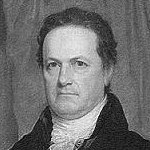Representatives of the Society of Friends in New York, via Samuel Parsons, sent a “memorial” to the convention to make their case:
The memorial of the representatives of the Society of Friends in the state of New-York, respectfully shows —
That having observed in the recent proceedings of the Convention, that a proposition has been introduced, requiring all persons who, from scruples of conscience, are averse to bearing arms, to pay an equivalent in money, to be estimated according to the expense in time, money, and equipment of an ordinary able-bodied militia man; and as such a measure would, if enforced, be a grievous burden upon the society of friends, your memorialists consider it to be their duty, in behalf of the society, respectfully to invite your attention to the subject.
Since the existence of the society, it has always maintained the doctrine, that war, in all its forms, whether offensive or defensive, is entirely at variance with the precepts and examples of Jesus Christ; and in consonance with this belief, they have uniformly declined to comply with all military requisitions.
We are aware, however, that it is considered by many, that although friends cannot, in conformity with their profession, bear arms, yet that they might and would pay a fine or tax as an equivalent, especially if its amount was applied to purposes, to which, in ordinary cases, they would be willing to contribute.
But it must on reflection be evident, that as the original requisition is repugnant to their sentiments, they could not conscientiously agree to any substitute for it, nor make any commutation for an act which they believe to be forbidden by their religious principles.
And they apprehend that any application of the moneys, however benevolent in its nature, would not lessen the force of their objections, as it cannot be supposed that a change in the appropriation of a tax can alter the principle upon which it is levied.
The obligation which they feel themselves under, not to comply with any military requisitions, nor to pay any equivalent, is founded, they conceive, not only on the doctrines of the Christian religion, but derived from the undeniable dictates and the unalienable rights of conscience, which can neither be communicated nor controlled by human authority; but which belongs essentially to the relation existing between man and his Creator:
And the free exercise of conscience, when it cannot be alleged that it tends to acts of licentiousness, or to the injury of others, is believed to be in accordance with the liberal views of the age in which we live, the republican institutions of the United States, and the spirit of the present constitution of this state.
Such an evidence of national liberality, of public regard to private and individual feeling, as is now sought for, will not be peculiar to the council of this state, as it is understood that under several of the state governments, the society of friends, on account of their conscientious scruples, are entirely and unconditionally exempt from all military requisition.
Your memorialists can have no doubt, that on a deliberate examination of the provision proposed to be introduced into the constitution, it will be seen that whilst it appears to have been designed to give some relief to those who are conscientiously scrupulous in this respect, it results in reducing that relief to the price of a substitute; which, as respects the society of friends, is placing it on a footing with which they can no more comply, than they can bear arms.
We therefore consider that it is not asking too much of the convention to request it to pause and deliberate, before a proposition is adopted which cannot be repealed from year to year, when its oppressive consequences are experienced — consequences which will be severely felt by the members of this society, exposed, as they must be, to the exactions of collectors, who in taking their property by distraint, often make the seizure to an extent entirely disproportionate to the sum demanded.
Your memorialists respectfully yet earnestly solicit, in behalf of the members of the society of this state, that the subject may again receive your serious deliberation, and that the constitution may be so modified, as that the religious society of friends called Quakers, may not only be exempt from bearing arms, but from incurring any fine or penalty in lieu thereof.
As it turned out, the convention wasn’t willing to go that far.
The relevant section of the state Constitution read:
“The militia of this State shall, at all times hereafter, be armed and disciplined, and in readiness for service; but all such inhabitants of this State, of any religious denomination whatever, as from scruples of conscience may be averse to bearing arms, shall be excused therefrom by paying to the State an equivalent in money; and the Legislature shall provide by law for the collection of such equivalent, to be estimated according to the expense, in time and money, of an ordinary, able-bodied militia-man.”


